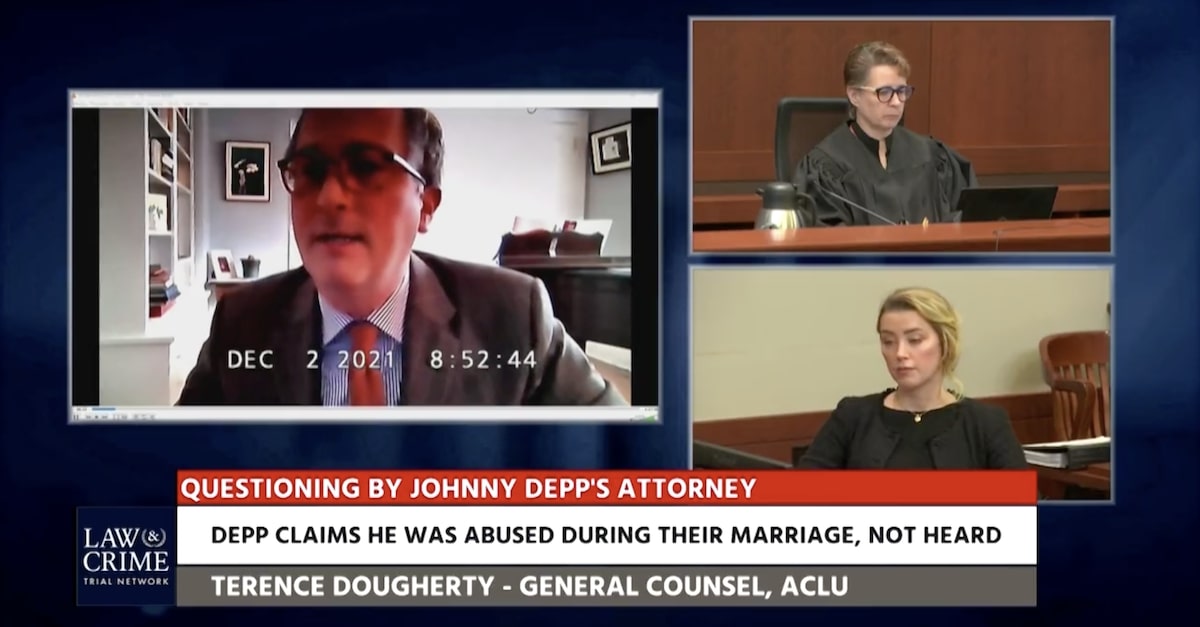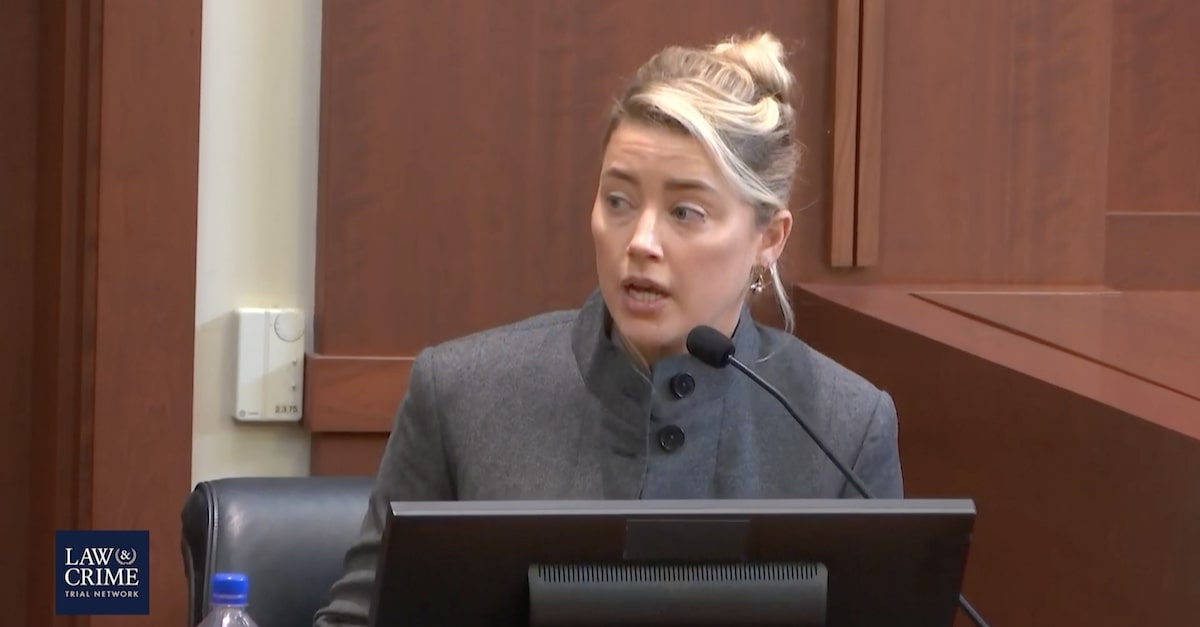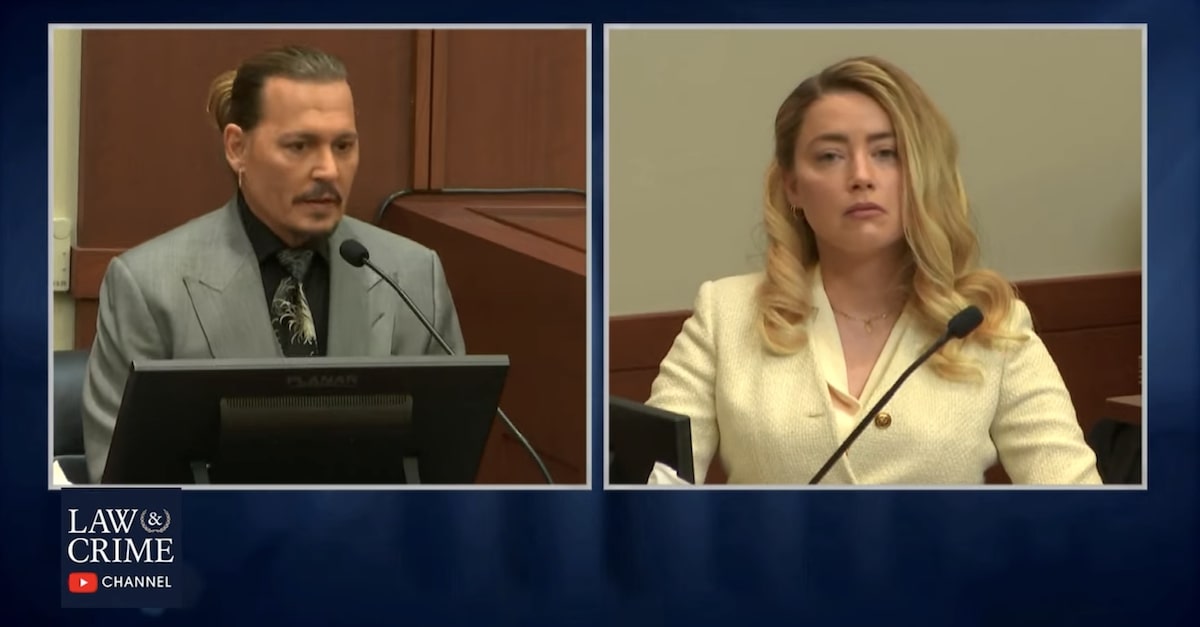
ACLU’s general counsel Terence Dougherty testifies about Amber Heard’s donation as a witness for Johnny Depp.
For more than a century, the American Civil Liberties Union has taken often-unpopular stances to defend the due process rights of people accused of serious crimes, but revealing testimony from their general counsel in Johnny Depp’s defamation trial sparked accusations that they sold out their legacy.
Breaking a nearly month-long silence, the ACLU addressed the fusillade of criticism that they wrote their ambassador Amber Heard’s editorial for a multi-million dollar bounty.
“During the current defamation lawsuit between Johnny Depp and Amber Heard, some have claimed that the ACLU made Ms. Heard an ambassador for gender justice and wrote an op-ed on her behalf in exchange for her pledge to donate money to the ACLU,” the group wrote in an unsigned post on Wednesday. “This is wrong.”
“Tension Between Some of the Values”
The denial falls nearly three weeks after the ACLU’s general counsel Terence Dougherty acknowledged in a deposition released last month that the group’s lawyers secretly helped write and place an op-ed that ran under Heard’s name in Washington Post under the headline: “I spoke up against sexual violence — and faced our culture’s wrath. That has to change.”
Only Heard’s byline appeared on the piece—as the ACLU’s ambassador on women’s rights—but Dougherty estimated that four ACLU lawyers helped draft it. One of them sent an email to the Post’s opinion editor stating, without qualification, that Heard was “beaten up” by Depp. Some legal commentators called the ACLU’s rhetorical conviction of Depp, before any criminal proceedings, a betrayal of its longtime principles.
“Like many people, I think, who are interested in civil liberties, I’ve had some concerns for a while about the direction of the ACLU,” prominent First Amendment attorney Ken White, widely known by his pen name Popehat, told Law&Crime in a phone interview. “And I can’t say whether this is an expression of that, but I think it’s grounds to ask questions. And I think there is a tension between some of the values the ACLU is pursuing, and some of its more classic values, like free speech, due process, and that type of thing.”
At the time, Heard had pledged to donate half of her $7 million divorce settlement with Depp to the ACLU and the rest to Children’s Hospital Los Angeles. To date, she has only donated a fraction of that amount to the former—and even less to the latter. Heard has claimed that she hasn’t fulfilled her obligations yet because Depp sued her, burying her in legal expenses. Depp’s lawyers have argued that she had the full amount of the settlement more than a year before that litigation.

Amber Heard testifies against Johnny Depp on May 16, 2022. (Photo via Law&Crime Network)
When Reuters fact checked the donation, the ACLU skirted the issue by writing that Heard “pledged her full settlement to charity.” Internal communications showed the spokesperson described having “nightmares” over the appropriate language to use. Depp’s attorney Benjamin Chew characterized this as evidence of a cover-up.
For White, the well-known legal commentator, it’s an illustration of a lesson about the importance of disclosure in the law.
“As a litigator and criminal defense lawyer, often the response to people finding things out is worse than the thing itself,” White said. “And it’s easy to make things worse than they actually are.”
Depp’s attorneys argue that the ACLU helped burnish a prominent donor’s credibility with an ambassadorship, then engaged in a cover-up when the pledge didn’t materialize. This, they argue, led to an unjustified legal and public relations boon for Heard. Indeed, a U.K. judge who ruled that Depp could be fairly described as a “wife beater” cited the purported donation as evidence that Heard wasn’t a “gold digger.”
According to Dougherty, Heard paid only $350,000 to the ACLU. Other donations in her name add up to $1.3 million, including $100,000 from Depp, $350,000 from a Fidelity Donor-Advised Fund, and $500,000 from payment from a Vanguard Donor Advised-Fund owned by her billionaire ex-boyfriend Elon Musk.
“A Problematical Appearance”
The ACLU’s executive director Anthony Romero, who called Musk one of their most significant supporters, recently came out in favor of the Tesla co-founder’s call to reinstate Donald Trump’s Twitter account, but the group insists that it does not take public stances on behalf of prominent donors.
“We do not write op-eds or offer ambassadorships in exchange for donations,” the post states. “Period. Becoming an ACLU Artist Ambassador is entirely voluntary; it is a favor to the ACLU, not vice versa.”
Regardless of the assertion, White said, it’s bad optics for the group.
“They say that there wasn’t a quid pro quo: It wasn’t like, you know, ‘I donate and you write something for me,'” White said. “But I think, doing an op-ed on behalf of someone who’s a major donor, that’s a disclosure that should be made. And it’s a problematical appearance.”
The heavily lawyered piece doesn’t mention Depp by name and makes only an oblique but unmistakable reference to Heard’s domestic abuse allegations against him.
“Then two years ago, I became a public figure representing domestic abuse, and I felt the full force of our culture’s wrath for women who speak out,” the editorial states.

Johnny Depp accuses Amber Heard of physical and emotional abuse on the second day of his testimony. (Photo via Law&Crime Network)
Depp sued over the line, which alludes to Heard’s filing for a restraining order in May 2016.
Heard alleged in her divorce filing that Depp abused her throughout the “entirety of our relationship,” and she showed up to court with an apparently bruised face, captured by paparazzi photographers and splashed over the tabloid headlines.
After the couple finalized their divorce in 2017, both issued a statement that neither of them lied for financial gain, and the controversy simmered—until the ACLU-facilitated Post op-ed reheated it once again. That happened in spite of an apparently concerted effort by Heard’s legal team in coordination with a preeminent civil liberties group to keep the matter out of the courts.
On Thursday, one of Heard’s attorneys acknowledged on the witness stand that he reviewed the draft specifically to avoid litigation.
“I reviewed and spent some significant time on it to make sure there was no meritorious claim that could be brought against her in connection with a defamation or related type of tort claim, and ideally, with that in mind, minimize possibility of being sued about it,” attorney Eric George testified on Thursday.
As evidenced by the trial, that effort failed. Depp sued under the doctrine of defamation by implication, arguing that even without invoking his name, the op-ed was written and publicly perceived with him in mind.
Under Fairfax County, Va.’s liberal defamation laws, that theory prevailed enough to get the case to trial, which is ongoing. Heard’s attorneys have argued that their client has a First Amendment right to call herself a “public figure representing domestic abuse,” regardless of whose version of events the jury believes.
The bulk of the editorial, the ACLU notes, involved the pressing issues of the day, one year into the relatively nascent #MeToo movement.
“In 2018, the issues Ms. Heard’s op-ed addressed — sexual assault and domestic violence — were especially salient in light of the confirmation hearing of Justice Brett Kavanaugh and the accusations of Dr. Christine Blasey Ford, as well as the fight to extend [the Violence Against Women Act], which ultimately lapsed in February of the following year,” the group wrote.
The ACLU did not immediately respond to an email requesting comment.
When trial resumes on Monday, Heard will continue to call witnesses in an effort to support her claims that Depp physically, sexually and emotionally abused her—and then launched into a vicious smear campaign in an attempt to discredit those accusations as a “hoax.” She countersued him for $100 million, twice the amount Depp is seeking. Depp asserts that Heard abused him, and she could be heard on tape taunting him that courts and the public would not believe it.
(Image via the Law&Crime Network)